- Home
- Bruce Sterling
Taklamakan Page 3
Taklamakan Read online
Page 3
On the surface of his spex, Katrinko's glowing fingertip whipped across the field of Pete's vision, and pointed. Something moving out there. Pete had company.
Pete eased a string of flashbangs from his sleeve. Then he hunkered down in place, trusting to his camouflage, and watching.
A robot was moving toward him among the dark pits of the fake stars. Wobbling and jittering.
Pete had never seen any device remotely akin to this robot. It had a porous, foamy hide, like cork and plastic. It had a blind compartmented knob for a head, and fourteen long fibrous legs like a frayed mess of used rope, terminating in absurdly complicated feet, like a boxful of grip pliers. Hanging upside down from bits of rocky irregularity too small to see, it would open its big warty head and flick out a forked sensor like a snake's tongue. Sometimes it would dip itself close to the ceiling, for a lingering chemical smooch on the surface of the rock.
Pete watched with murderous patience as the device backed away, drew nearer, spun around a bit, meandered a little closer, sucked some more ceiling rock, made up its mind about something, replanted its big grippy feet, hoofed along closer yet, lost its train of thought, retreated a bit, sniffed the air at length, sucked meditatively on the end of one of its ropy tentacles.
It finally reached him, walked deftly over his legs, and dipped up to lick enthusiastically at the chemical traces left by his gripweb. The robot seemed enchanted by the taste of the glove's elastomer against the rock. It hung there on its fourteen plier feet, loudly licking and rasping.
Pete lashed out with his pick. The razored point slid with a sullen crunch right through the thing's corky head.
It went limp instantly, pinned there against the ceiling. Then with a nasty rustling it deployed a whole unsuspected set of waxy and filmy appurtenances. Complex bug-tongue things, mandible scrapers, delicate little spatulas, all reeling and trembling out of its slotted underside.
It was not going to die. It couldn't die, because it had never been alive. It was a piece of biotechnical machinery. Dying was simply not on its agenda anywhere. Pete photographed the device carefully as it struggled with obscene mechanical stupidity to come to workable terms with its new environmental parameters. Then Pete levered the pick loose from the ceiling, shook it loose, and dropped the pierced robot straight down to hell.
Pete climbed more quickly now, favoring the strained shoulder. He worked his way methodically out to the relative ease of the vertical wall, where he discovered a large mined-out vein in the constellation Sagittarius. The vein was a big snaky recess where some kind of ore had been nibbled and strained from the rock. By the look of it, the rock had been chewed away by a termite host of tiny robots with mouths like toenail clippers.
He signaled on the spex for Katrinko. The neuter followed along the clipped and anchored line, climbing like a fiend while lugging one of the haulbags. As Katrinko settled in to their new base camp, Pete returned to the louvers to fetch the second bag. When he'd finally heaved and grappled his way back, his shoulder was aching bitterly and his nerves were shot. They were done for the day.
Katrinko had put up the emission-free encystment web at the mouth of their crevice. With Pete returned to relative safety, she reeled in their smart-ropes and fed them a handful of sugar.
Pete cracked open two capsules of instant fluff, then sank back gratefully into the wool.
Katrinko took off her mask. She was vibrating with alert enthusiasm. Youth, thought Pete–youth, and the 8 percent metabolic advantage that came from lacking sex organs. "We're in so much trouble now," Katrinko whispered, with a feverish grin in the faint red glow of a single indicator light. She no longer resembled a boy or a young woman. Katrinko looked completely diabolical. This was a nonsexed creature. Pete liked to think of her as a "she," because this was somehow easier on his mind, but Katrinko was an "it." Now it was filled with glee, because finally it had placed itself in a proper and pleasing situation. Stark and feral confrontation with its own stark and feral little being.
"Yeah, this is trouble," Pete said. He placed a fat medicated tick onto the vein inside of his elbow. "And you're taking first watch."
Pete woke four hours later, with a heart-fluttering rise from the stunned depths of chemically assisted delta-sleep. He felt numb, and lightly dusted with a brain-clouding amnesia, as if he'd slept for four straight days. He had been profoundly helpless in the grip of the drug, but the risk had been worth it, because now he was thoroughly rested. Pete sat up, and tried the left shoulder experimentally. It was much improved.
Pete rubbed feeling back into his stubbled face and scalp, then strapped his spex on. He discovered Katrinko squatting on her haunches, in the radiant glow of her own body heat, pondering over an ugly mess of spines, flakes, and goo.
Pete touched spex knobs and leaned forward. "What you got there?"
"Dead robots. They ate our foamchocks, right out of the ceiling. They eat anything. I killed the ones that tried to break into camp." Katrinko stroked at a midair menu, then handed Pete a fiber lead for his spex. "Check this footage I took."
Katrinko had been keeping watch with the gelcams, picking out passing robots in the glow of their engine heat. She'd documented them on infrared, saving and editing the clearest live-action footage. "These little ones with the ball-shaped feet, I call them keets," she narrated, as the captured frames cascaded across Pete's spex-clad gaze. "They're small, but they're really fast, and all over the place–I had to kill three of them. This one with the sharp spiral nose is a drillet. Those are a pair of dubits. The dubits always travel in pairs. This big thing here, that looks like a spilled dessert with big eyes and a ball on a chain, I call that one a lurchen. Because of the way it moves, see? It's sure a lot faster than it looks."
Katrinko stopped the spex replay, switched back to live perception, and poked carefully at the broken litter before her booted feet. The biggest device in the heap resembled a dissected cat's head stuffed with cables and bristles. "I also killed this piteen. Piteens don't die easy, man."
"There's lots of these things?"
"I figure hundreds, maybe thousands. All different kinds. And every one of 'em as stupid as dirt. Or else we'd be dead and disassembled a hundred times already."
Pete stared at the dissected robots, a cooling mass of nerve-netting, batteries, veiny armor plates, and gelatin. "Why do they look so crazy?"
"'Cause they grew all by themselves. Nobody ever designed them." Katrinko glanced up. "You remember those big virtual spaces for weapons design, that they run out in Alamagordo?"
"Yeah, sure, Alamagordo. Physics simulations on those super-size quantum gelbrains. Huge virtualities, with ultra-fast, ultra-fine detail. You bet I remember New Mexico! I love to raid a great computer lab. There's something so traditional about the hack."
"Yeah. See, for us NAFTA types, physics virtualities are a military app. We always give our tech to the military whenever it looks really dangerous. But let's say you don't share our NAFTA values. You don't wanna test new weapons systems inside giant virtualities. Let's say you want to make a can-opener, instead."
During her sleepless hours huddling on watch, Katrinko had clearly been giving this matter a lot of thought. "Well, you could study other people's can-openers and try to improve the design. Or else you could just set up a giant high-powered virtuality with a bunch of virtual cans inside it. Then you make some can-opener simulations, that are basically blobs of goo. They're simulated goo, but they're also programs, and those programs trade data and evolve. Whenever they pierce a can, you reward them by making more copies of them. You're running, like, a million generations of a million different possible can-openers, all day every day, in a simulated space."
The concept was not entirely alien to Spider Pete. "Yeah, I've heard the rumors. It was one of those stunts like Artificial Intelligence. It might look really good on paper, but you can't ever get it to work in real life."
"Yeah, and now it's illegal too. Kinda hard to police, though. But let's imagin
e you're into economic warfare and you figure out how to do this. Finally, you evolve this super weird, super can-opener that no human being could ever have invented. Something that no human being could even imagine. Because it grew like a mushroom in an entire alternate physics. But you have all the specs for its shape and proportions, right there in the supercomputer. So to make one inside the real world, you just print it out like a photograph. And it works! It runs! See? Instant cheap consumer goods."
Pete thought it over. "So you're saying the Sphere people got that idea to work, and these robots here were built that way?"
"Pete, I just can't figure any other way this could have happened. These machines are just too alien. They had to come from some totally nonhuman, autonomous process. Even the best Japanese engineers can't design a jelly robot made out of fuzz and rope that can move like a caterpillar. There's not enough money in the world to pay human brains to think that out."
Pete prodded at the gooey ruins with his pick. "Well, you got that right."
"Whoever built this place, they broke a lot of rules and treaties. But they did it all really cheap. They did it in a way that is so cheap that it is beyond economics." Katrinko thought this over. "It's way beyond economics, and that's exactly why it's against all those rules and the treaties in the first place."
"Fast, cheap, and out of control."
"Exactly, man. If this stuff ever got loose in the real world, it would mean the end of everything we know."
Pete liked this last statement not at all. He had always disliked apocalyptic hype. He liked it even less now because under these extreme circumstances it sounded very plausible. The Sphere had the youngest and the biggest population of the three major trading blocs, and the youngest and the biggest ideas. People in Asia knew how to get things done. "Y'know, Lyle Schweik once told me that the weirdest bicycles in the world come out of China these days."
"Well, he's right. They do. And what about those Chinese circuitry chips they've been dumping in the NAFTA markets lately? Those chips are dirt cheap and work fine, but they're full of all this crazy leftover wiring that doubles back and gets all snarled up... . I always thought that was just shoddy workmanship. Man, ‘workmanship' had nothing to do with those chips."
Pete nodded soberly. "Okay. Chips and bicycles, that much I can understand. There's a lot of money in that. But who the heck would take the trouble to create a giant hole in the ground that's full of robots and fake stars? I mean, why?"
Katrinko shrugged. "I guess it's just the Sphere, man. They still do stuff just because it's wonderful."
The bottom of the world was boiling over. During the passing century, the nuclear test cavity had accumulated its own little desert aquifer, a pitch-black subterranean oasis. The bottom of the bubble was an unearthly drowned maze of shattered cracks and chemical deposition, all turned to simmering tidepools of mechanical self-assemblage. Oxygen-fizzing geysers of black fungus tea.
Steam rose steadily in the darkness amid the crags, rising to condense and run in chilly rivulets down the spherical star-spangled walls. Down at the bottom, all the water was eagerly collected by aberrant devices of animated sponge and string. Katrinko instantly tagged these as "smits" and "fuzzens."
The smits and fuzzens were nightmare dishrags and piston-powered spaghetti, leaping and slopping wetly from crag to crag. Katrinko took an unexpected ease and pleasure in naming and photographing the machines. Speculation boiled with sinister ease from the sexless youngster's vulpine head, a swift off-the-cuff adjustment to this alien toy world. It would seem that the kid lived rather closer to the future than Pete did.
They cranked their way from boulder to boulder, crack to liquid crack. They documented fresh robot larvae, chewing their way to the freedom of darkness through plugs of goo and muslin. It was a whole miniature creation, designed in the senseless gooey cores of a Chinese supercomputing gelbrain, and transmuted into reality in a hot broth of undead mechanized protein. This was by far the most amazing phenomenon that Pete had ever witnessed. Pete was accordingly plunged into gloom. Knowledge was power in his world. He knew with leaden certainty that he was taking on far too much voltage for his own good.
Pete was a professional. He could imagine stealing classified military secrets from a superpower, and surviving that experience. It would be very risky, but in the final analysis it was just the military. A rocket base, for instance–a secret Asian rocket base might have been a lot of fun.
But this was not military. This was an entire new means of industrial production. Pete knew with instinctive street-level certainty that tech of this level of revolutionary weirdness was not a spy thing, a sports thing, or a soldier thing. This was a big, big money thing. He might survive discovering it. He'd never get away with revealing it.
The thrilling wonder of it all really bugged him. Thrilling wonder was at best a passing thing. The sober implications for the longer term weighed on Pete's soul like a damp towel. He could imagine escaping this place in one piece, but he couldn't imagine any plausible aftermath for handing over nifty photographs of thrilling wonder to military spooks on the Potomac. He couldn't imagine what the powers-that-were would do with that knowledge. He rather dreaded what they would do to him for giving it to them.
Pete wiped a sauna cascade of sweat from his neck.
"So I figure it's either geothermal power, or a fusion generator down there," said Katrinko.
"I'd be betting thermonuclear, given the circumstances." The rocks below their busy cleats were a-skitter with bugs: gippers and ghents and kebbits, dismantlers and glue-spreaders and brain-eating carrion disassemblers. They were profoundly dumb little devices, specialized as centipedes. They didn't seem very aggressive, but it surely would be a lethal mistake to sit down among them.
A barnacle thing with an iris mouth and long whipping eyes took a careful taste of Katrinko's boot. She retreated to a crag with a yelp.
"Wear your mask," Pete chided. The damp heat was bliss after the skin-eating chill of the Taklamakan, but most of the vents and cracks were spewing thick smells of hot beef stew and burnt rubber, all varieties of eldritch mechano-metabolic byproduct. His lungs felt sore at the very thought of it.
Pete cast his foggy spex up the nearest of the carbon-fiber columns, and the golden, glowing, impossibly tempting lights of those starship portholes up above.
Katrinko led point. She was pitilessly exposed against the lacelike girders. They didn't want to risk exposure during two trips, so they each carried a haul bag.
The climb went well at first. Then a machine rose up from wet darkness like a six-winged dragonfly. Its stinging tail lashed through the thready column like the kick of a mule. It connected brutally. Katrinko shot backwards from the impact, tumbled ten meters, and dangled like a ragdoll from her last backup chock.
The flying creature circled in a figure eight, attempting to make up its nonexistent mind. Then a slower but much larger creature writhed and fluttered out of the starry sky, and attacked Katrinko's dangling haulbag. The bag burst like a Christmas piñata in a churning array of taloned wings. A fabulous cascade of expensive spy gear splashed down to the hot pools below.
Katrinko twitched feebly at the end of her rope. The dragonfly, cruelly alerted, went for her movement. Pete launched a string of flashbangs.
The world erupted in flash, heat, concussion, and flying chaff. Impossibly hot and loud, a thunderstorm in a closet. The best kind of disappearance magic: total overwhelming distraction, the only real magic in the world.
Pete soared up to Katrinko like a balloon on a bungee-cord. When he reached the bottom of the starship, twenty-seven heart-pounding seconds later, he had burned out both the smart-ropes.
The silvery rain of chaff was driving the bugs to mania. The bottom of the cavern was suddenly a-crawl with leaping mechanical heat-ghosts, an instant menagerie of skippers and humpers and floppers. At the rim of perception, there were new things rising from the depths of the pools, vast and scaly, like golden carp to a rain
of fish chow.
Pete's own haulbag had been abandoned at the base of the column. That bag was clearly not long for this world.
Katrinko came to with a sudden winded gasp. They began free-climbing the outside of the starship. It surface was stony, rough and uneven, something like pumice, or wasp spit.
They found the underside of a monster porthole and pressed themselves flat against the surface.
There they waited, inert and unmoving, for an hour. Katrinko caught her breath. Her ribs stopped bleeding. The two of them waited for another hour, while crawling and flying heat-ghosts nosed furiously around their little world, following the tatters of their programming. They waited a third hour.
Finally they were joined in their haven by an oblivious gang of machines with suckery skirts and wheelbarrows for heads. The robots chose a declivity and began filling it with big mandible trowels of stony mortar, slopping it on and jaw-chiseling it into place, smoothing everything over, tireless and pitiless.
Pete seized this opportunity to attempt to salvage their lost equipment. There had been such fabulous federal bounty in there: smart audio bugs, heavy-duty gelcams, sensors and detectors, pulleys, crampons and latches, priceless vials of programmed neural goo... . Pete crept back to the bottom of the spacecraft.
Everything was long gone. Even the depleted smartropes had been eaten, by a long trail of foraging keets. The little machines were still squirreling about in the black lace of the column, sniffing and scraping at the last molecular traces, with every appearance of satisfaction.

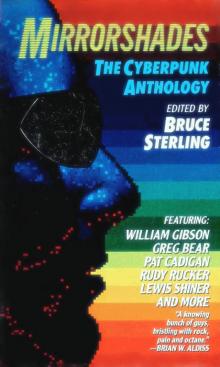 Mirrorshades: The Cyberpunk Anthology
Mirrorshades: The Cyberpunk Anthology The Wonderful Power of Storytelling
The Wonderful Power of Storytelling Love Is Strange (A Paranormal Romance)
Love Is Strange (A Paranormal Romance)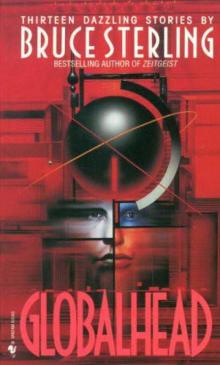 Globalhead
Globalhead Essays. FSF Columns
Essays. FSF Columns The Hacker Crackdown
The Hacker Crackdown Bicycle Repairman
Bicycle Repairman Black Swan
Black Swan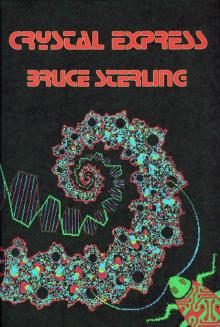 Crystal Express
Crystal Express Islands in the Net
Islands in the Net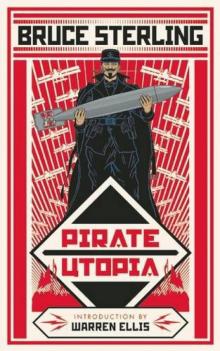 Pirate Utopia
Pirate Utopia GURPS' LABOUR LOST
GURPS' LABOUR LOST The Dead Media Notebook
The Dead Media Notebook Unstable Networks
Unstable Networks The Manifesto of January 3, 2000
The Manifesto of January 3, 2000 Heavy Weather
Heavy Weather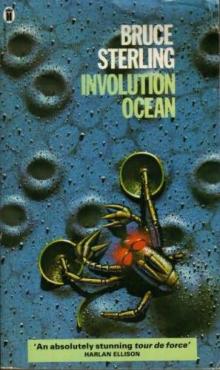 Involution Ocean
Involution Ocean The Epic Struggle of the Internet of Things
The Epic Struggle of the Internet of Things A Good Old-Fashioned Future
A Good Old-Fashioned Future The Littlest Jackal
The Littlest Jackal Zeitgeist
Zeitgeist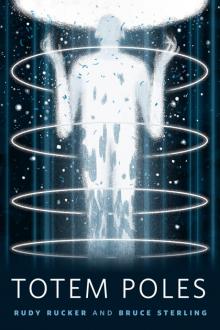 Totem Poles
Totem Poles Ascendancies
Ascendancies CyberView 1991
CyberView 1991 War Is Virtual Hell
War Is Virtual Hell Taklamakan
Taklamakan Holy Fire
Holy Fire Cyberpunk in the Nineties
Cyberpunk in the Nineties Schismatrix Plus
Schismatrix Plus The Artificial Kid
The Artificial Kid Essays. Catscan Columns
Essays. Catscan Columns Maneki Neko
Maneki Neko Distraction
Distraction In Paradise
In Paradise Red Star, Winter Orbit
Red Star, Winter Orbit Luciferase
Luciferase